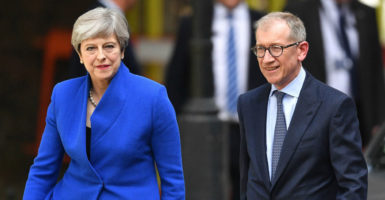In a huge political upset, Britain’s Conservative Party has failed to secure an overall majority, falling just short of the 326 seats needed in the 650-seat House of Commons.
Prime Minister Theresa May will now lead a minority government.
The Conservatives will rely on the support of Northern Ireland’s Democratic Unionist Party to remain in power, who won 10 seats. It is conceivable that another general election could be held in the coming months if the Conservatives are unable to drive legislation forward.
While the Conservatives lost seats, British voters did however reject the idea of a far-left Labour government, with the socialist emphasis on big spending, increased taxes, and heavy state intervention.
Labour leader Jeremy Corbyn, an admirer of Karl Marx whose shadow Cabinet includes former communists, was viewed as too extreme by the British electorate, who were not prepared to bring to power a socialist government that could not be relied upon to grow the economy and deliver Brexit in an effective manner.
Ultimately, Corbyn’s Marxist-influenced outlook was perceived as a throwback to the 1970s, when a left-wing Labour government brought Britain to its knees, on the verge of bankruptcy.
The Conservative administration faces significant challenges ahead, from negotiating with a largely hostile European Union to securing a series of free trade deals with countries across the world.
It must also deal with a rising Islamist terror threat, one that will require significantly tougher counterterror measures, and a willingness to do what is necessary to decisively defeat the Islamic State and other Islamist terror groups, both at home and abroad.
But Britain has tremendous capacity to ensure that it thrives and prospers outside the EU, and remain at the heart of the transatlantic alliance.
A clear majority of British voters still wish to see their country move forward outside the EU as an outward-looking, truly sovereign Britain, while leading on the world stage.
Even the Labour Party pledged to implement Brexit in its manifesto, a reflection of the fact that at least a third of its supporters voted to leave the EU in the 2016 referendum.
As the world’s fifth-largest economy, with the globe’s biggest financial center, and as one of the strongest military powers in the world, Brexit Britain will be a force to be reckoned with, despite the upheaval generated by last night’s election.
Brexit will not be derailed by a climate of political uncertainty. The will of the British people is clear: Britain’s future lies in sovereignty and self-determination.






















